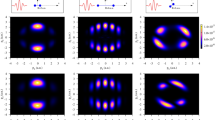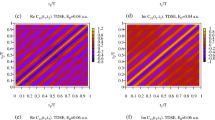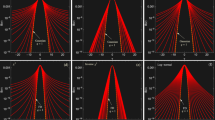Abstract
IN two letters in NATURE recently1, Dr. L. Tonks has expressed disagreement with the use of the Lorentz formula relating the ionisation density N and refractive index of an ionised medium for waves of frequency p/2. In the second of these letters, he refers to some work of mine2 in which this formula was derived ab initio (not by Lorentz's method as he suggests, but by a method which avoids some of the difficulties of applying Lorentz's argument directly to an ionised medium), and he suggests that this derivation is in error on account of the omission of a contribution to the field acting on an electron of the medium, and further that the inclusion of the omitted contribution reduces the dispersion formula to the Sellmeyer form 21+
This is a preview of subscription content, access via your institution
Access options
Subscribe to this journal
Receive 51 print issues and online access
$199.00 per year
only $3.90 per issue
Buy this article
- Purchase on Springer Link
- Instant access to full article PDF
Prices may be subject to local taxes which are calculated during checkout
Similar content being viewed by others
References
L. Tonks, NATURE, 132, 101, July 15, and 710, Nov. 4, 1933.
D. R. Hartree, Proc. Camb. Phil. Soc., 25, 97; 1929: 27, 143; 1931.
Author information
Authors and Affiliations
Rights and permissions
About this article
Cite this article
HARTREE, D. The Dispersion Formula for an Ionised Medium. Nature 132, 929–930 (1933). https://doi.org/10.1038/132929a0
Issue Date:
DOI: https://doi.org/10.1038/132929a0
This article is cited by
-
Refraction of Ionised Media
Nature (1934)
Comments
By submitting a comment you agree to abide by our Terms and Community Guidelines. If you find something abusive or that does not comply with our terms or guidelines please flag it as inappropriate.



